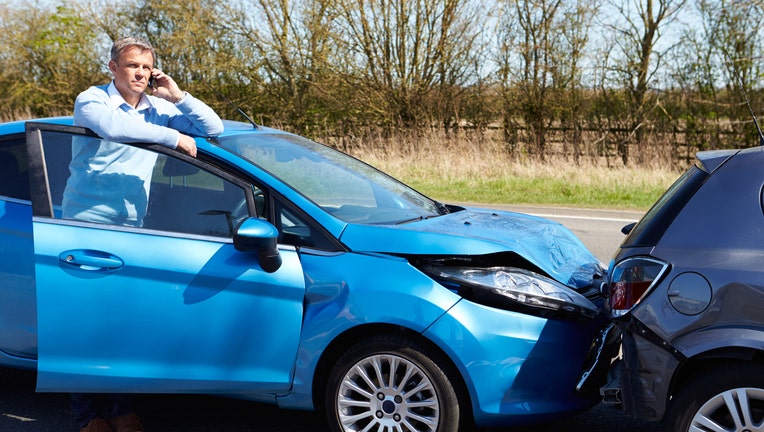Filing an auto insurance claim? Avoid these mistakes

Taking the wrong steps could cause you to leave money on the table. (iStock)
Car insurance can be expensive, with an average monthly premium of $129, according to the insurance comparison website The Zebra. But when you need it, your policy can pay you far more than you’ve paid into it — also, you can explore auto insurance options to save money.
In 2019, the Insurance Information Institute found that there were 6.13 collision auto claims per 100 earned car years, which is equal to 365 days of insured coverage for one vehicle. The average payout per claim was a decade-high at $3,750. Other types of coverage didn’t see anywhere close to as many claims, but regardless of what you need from your insurance policy, it’s important to know what not to do during the claims process.
These are the 3 worst auto insurance claim mistakes
If you find yourself in the unfortunate situation where you need to file an insurance claim, then you're going to want to avoid these three big mistakes.
- Filing a claim unnecessarily
- Not taking photos
- Being untruthful or too thorough
1. Filing a claim unnecessarily
Not all accidents are worth calling your insurance company over, especially if it’s a collision or comprehensive claim. For example, if your windshield cracks, the cost of repairing or replacing the glass is likely less than your policy’s deductible, which means you’ll get nothing from your policy.
Even if your car insurance policy would pay out a little bit above your deductible, filing a claim can cause your monthly premium to increase, meaning you may not save any money at all. In other words, it may not be worth it to call your insurance agency unless the damage is significant, and you’d be out hundreds or even thousands of dollars if you were to pay for it yourself. To make sure you are not overpaying for car insurance, it’s free to check online through Credible’s partners.
THIS IS THE BEST WAY TO LOWER YOUR CAR INSURANCE COSTS
2. Not taking photos
As much as the insurance company commercials might not always be on your side, they are, after all, a business, and minimizing claims payouts helps maximize their profits.
As a result, it’s crucial that you take photos and document all evidence you have of what happened, so a lack of proof can’t be used to argue a lower payout or no payout at all.
In addition to the damage, you may also want to take pictures of the conditions of the road and the weather that day, the positions of the vehicles involved in the accident, and any other factors that resulted in your loss.
Additionally, if your vehicle has suffered dents or dings in the past, it’s a good idea to document that now, so your insurance company can’t claim that new damage is actually old damage.
If you're looking for comprehensive coverage for your vehicle, then you're going to want to weigh your options to strike the best deal. Credible can help connect you with an insurance broker, which can compare insurance rates instantly.
SELLING YOUR CAR? 5 WAYS TO USE THE PROCEEDS
3. Being untruthful or too thorough
Making material misrepresentations about what happened could not only result in no payout but also get your coverage canceled. You’ll also want to avoid lying about your condition — if you don’t feel fine, don’t say that you feel fine. Otherwise, that could be used against you in the future.
Even if you receive a payout on your claim where you’ve misrepresented aspects of the accident, your insurer could return and void the claim at a later date and require you to repay what you received.
On the flip side, you’ll also want to avoid offering too much information. Simply answer the questions the agent and claims adjuster ask. If you’re too chatty, you could accidentally say something inaccurate or embellished, or you could muddy the context. And depending on the situation, it could complicate your claim and lead to delays or even denial.
5 TIMES TO CONTACT YOUR CAR INSURANCE AGENCY
The bottom line
Getting in an accident or suffering some other form of damage to your vehicle is never ideal, and auto insurance is there to protect you financially if you need it. But it’s important to keep in mind that filing a car insurance claim isn’t always the best move.
Also, it’s crucial that you provide enough evidence to support your claim and avoid being untruthful — if your claims agent learns something that disputes your claim, it could have long-lasting consequences. Stick to answering the questions by an agent or adjuster concisely and accurately.
Finally, before you ever get to the claims process, it’s important to make sure you have the right auto insurance policy for your needs. You can explore auto insurance options through Credible’s partners to get information on and compare policies side by side.
As you shop around, look at the same coverage types and amounts with each company. Some will offer lower rate quotes online for a skinny policy with few benefits to encourage you to sign up. Make sure you’re comparing apples to apples, so you can find the best policy for you.
In addition to rates, you’ll also want to do some research on how well each insurer handles the claims process. Some insurance companies do a much better job at the repair process, the rental process, settlement, and other aspects than others.

